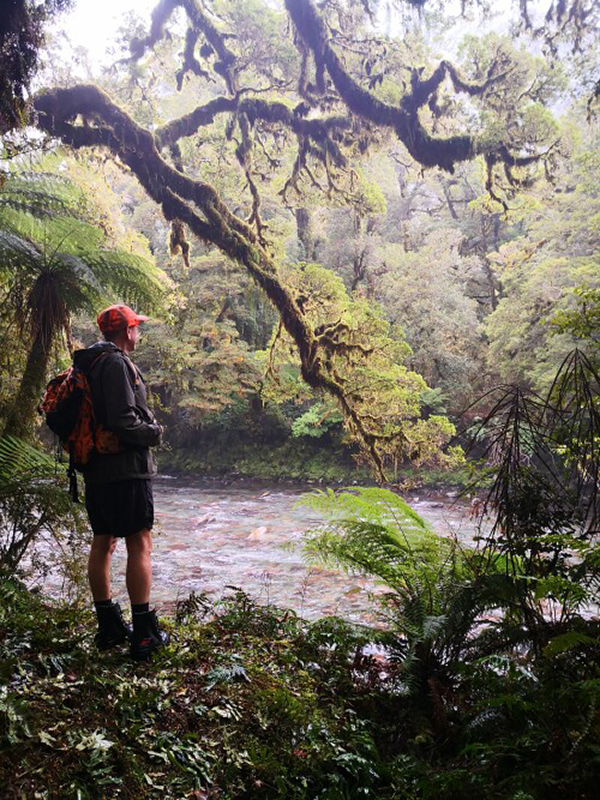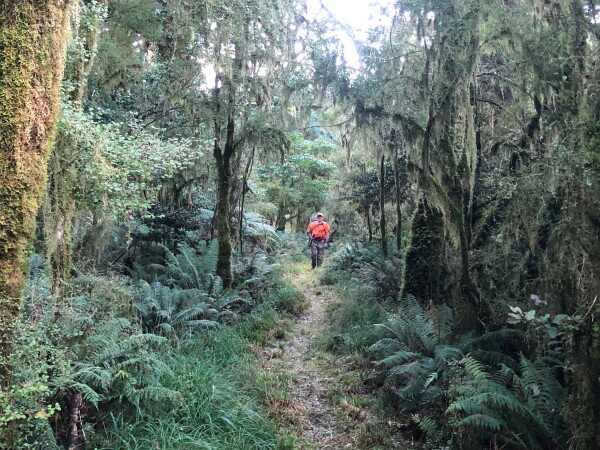The importance of one foot in front of the other
Richard Wells never thought his annual father-daughter Roar hunting trip would be one to change his life. The decades-long hunting tradition for the Wells family provides a good excuse to get out of the office, and time to sharpen their hunting skills. Last year’s expedition took the pair into Central Otago’s backcountry, and it was on that trip Richard learnt the pain of a “simple mistake with severe consequences”.
The pair arrived at their hut in their Pisa Range block and were unpacking the ute when they saw a young stag making its way up the gully, the first sign of an epic hunting trip.
The next morning they were up before sunrise, and packed with the anticipation of staying out overnight.
“So the idea was that my daughter was going to be shooting and I was the pack horse. So, I filled a pack up with two sleeping bags, a fly, one gas cooker and some dehy meals. It was a full pack, but not heavy.”
At first light they set off to stalk the stags. Five hours later there was only a couple hundred metres between them all. But a change in the wind gave them away and the animals bolted.
After stopping for a cuppa and food to refuel, they decided to explore the next ridge before retreating back to the hut.
It was mid-afternoon at this stage and the pair were starting to feel tired, but knew the hut was only a 6km walk away.
“There was no pressure. We had beautiful weather, it had been a long day but we were heading home so we just took our time.

Richard Wells eyeing up the Moeraki River, South Westland.
“We were literally about 200m from the hut. At this stage we had been out about 11 hours, so a long day for us as we aren’t very patient hunters but we put a lot of patience into that day.
“By this time my feet were getting a bit sore and I was walking on the grass verge. I wasn’t watching where I was walking and all of a sudden, I slipped. It felt like I was on ice. I had a rifle slung on my shoulder, and I fell really heavily on my back.
“It was an absolutely slap-stick Charlie Chaplin fall where dust came up,” he recalled.
Both his feet came out from under him, resulting in whiplash from his pack and a grazed right elbow from protecting his rifle.
“At that stage, other than the effect on my dignity and some shock, I felt OK and got up and carried on.
It wasn’t until two days later while on a different hunting block in the Blue Mountains near Tapanui that Richard started to feel the effects of that fall.
That morning, they were walking up a ridge when his neck locked and his mobility dropped.
“I had to say, ‘I’m done here’.”
“I couldn’t hunt effectively because I couldn’t look uphill. I was struggling to pull myself up, struggling to hold the rifle.”
“That night I was in agony; my whole neck and arms had shooting pains and muscle spasms. I’ve had broken arms and stuff before but nothing like this. I couldn't even lift my elbow above by chest height.
Despite x-rays, ultrasounds and painkillers, what followed for Richard was a pain-riddled, sleepless six weeks before being correctly diagnosed with a damaged nerve.

Richard Wells in South Westland on a recent Roar hunt
“So, I was hurting like crazy, I never knew you could hurt so much - I couldn't even pick up a cup of coffee with my left hand.”
“Right through May I stayed at home in agony and never slept, and quickly lost 10kgs, but mostly I was really fearful that my arm would never work again, the physio even said, ‘this may never come right’.”
Ten months on he estimates he has lost 30% of capability in his left arm.
“I've got back my quality of life back which is fantastic. . . it's not going to stop me hunting, there’s no doubt about that. But it will mean changes.”
Determined to continue the hunting tradition with his daughter, Richard has spent the past year building up his strength ready for their next hunting trip in Haast this April.
“The big lesson for me was, it can happen to anyone”
Richard admits his hunting future looks quite different now, from a safety perspective he is “a bit compromised”.
A life-long hunter whose experience stems from a rural childhood in the Marlborough Sounds, to wallaby hunting in South Canterbury, and tahr and deer hunting in the mountains of the South Island.
“So [the injury] wasn’t down to lack of knowledge or experience, or gear. But the big lesson for me was it can happen to anyone, even with beautiful weather, the right gear, and walking on a road, not fully laden, literally within a stone's throw of the hut.
“It was just that I didn’t maintain discipline of watching where I was putting my feet. I was already focused on thinking about boots off, feet in the creek and a cup of tea - all the good stuff.”
“So yeah, a silly accident, severe consequences.”
“A lot of people would be embarrassed to talk about it but I'm not, because if anybody reading this can avoid the pain I went through, that would be a good thing.”
Richard’s injury showed him how an injury can impact those around him and the importance of looking out for each other, and to ask for help when you need it, he said.
Seven Roar hunting tips for staying safe
- Research the area and have a backup plan
- Check the weather and be prepared for it to change
- Pack a rain jacket and shelter just in case
- Tell a mate your plans before you go
- Check in with your mates regularly
- Take a map and keep track of your movements
- Watch your footing and take your time
About 'Have a hmmm'
This story is part of ACC New Zealand's Have a Hmmm... awareness campaign.
'Have a hmmm' is a constructive wero (challenge) to Aotearoa: Take action to avoid injury and keep yourself, your whānau, friends and community safe and well. Injury can have life-changing impacts – for those who are injured, their whānau and society. Around 90% of injuries are not random events. They're predictable and therefore preventable. Yet, ACC sees 5,000 injury claims per day. That's around 2 million claims a year.
ACC is starting by asking New Zealanders to do something easy: take a moment, 'Have a hmmm' and think of others before acting. Learn more about the campaign here.